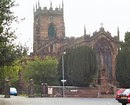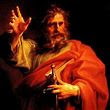St Mary’s Stretton – The Power of
Prayer
Revelation 8:1-5 and Mark 11:22-24.
Revelation 8:1-5 and Mark 11:22-24.
Recording available from St Mary's website
http://www.stmarys-stretton.org.uk/sermons
A man was sleeping at night in his cabin when suddenly
his room filled with bright light and the Saviour appeared. The Lord told the
man He had work for him to do, and showed him a large rock in front of his
cabin. The Lord explained that the man was to push against the rock with all
his might. This, the man did, day after day.
For many years, he toiled from sun up to sun down with
his shoulders set squarely against the cold, massive surface of the unmoving
rock, pushing with all his might. Each night the man returned to his cabin
sore, and worn out, feeling that his whole day had been spent in vain.
Seeing that the man was showing signs of
discouragement, the Adversary decided to enter the picture by placing thoughts
into the man’s weary mind:
“You’ve been pushing against that rock for a long
time, and it hasn’t budged.
Why kill yourself over this? You’re never going to
move it” —thus, giving the man the impression that the task was impossible and
that he was a failure. These thoughts discouraged and disheartened the man.
“Why kill myself over this?” he thought. “I’ll just put in my time, giving just the minimum effort and that’ll be good enough.”
And that’s just what he planned to do —until one day he
decided to make it a matter of prayer and take his troubled thoughts to the
Lord.
“Lord” he said, “I’ve laboured long and hard in Your
service, putting all my strength to do that which You have asked. Yet, after
all this time, I have not even budged that rock by half a millimeter. What is
wrong? Why am I failing?”
The Lord responded compassionately,
“My friend, when I asked you to serve Me —you accepted.
I told you that your task was to push against the rock with all your strength,
which you have done.
Never once did I mention to you that I expected you to
move it. Your task was to push. Now you come to Me —with your strength spent,
thinking that you’ve failed. But is that really so?”
“Look at yourself. Your arms are strong and muscular.
Your back sinew is mighty. Your hands are callused from the constant pressure;
and your legs have become massive and hard. Through opposition, you have grown
much and your abilities now surpass that which you used to have. Yet you have
not moved the rock. However, your calling was to be obedient and to push and to
exercise your faith and trust in My wisdom. This you have done. I, my friend,
will now move the rock.”
P.U.S.H.
Pray until something happens.
…your
calling was to be obedient and push and to exercise your faith and trust in my
wisdom.
Let me take you to a
garden and recall the story of the first human couple as we hear it in the
first book of the Bible, Genesis.
They lived in perfect
harmony with the whole of creation, they had meaningful tasks to fulfill and
they were as friends with God.
However, in this perfect
garden paradise God had planted the tree of knowledge of good and evil.
The first human couple could
eat any of the fruit of the garden with the exception of the fruit from this
tree.
Enter the tempter who
cunningly asks – ‘did God say…’
They gave into the
temptation and ate the fruit and whereas up until now they had only known the
good now they become aware of the non-good.
Now they had to face the
choice between good and non-good.
Once they had that
knowledge there was no way of unknowing.
Things change rapidly and
very soon, non-good is lurking at Cain’s door. In Genesis 4.7 we read “…if you
refuse to do what is right, then watch out! Sin is crouching at the door, eager
to control you. But you must subdue it and be its master."
Cain does not master evil and
slays his brother.
The blood of innocent Abel
and the blood stained hands of Cain passed on down the generations.
This dis-ease continued to
grow and affect the whole of the human race.
Therefore, we all now face the
choice between the good and the non-good, between what brings life, health and
growth and what brings hurt, death and destruction.
For the most part, we know
right from wrong instinctively, yet we so often make the wrong choices for all
sorts of reasons.
Those wrong choices will
often lead to awful tragedies of unimaginable proportions.
We are in a mess because
of this dis-ease that affects everyone to some degree or other.
In our human nature, we
would tend to categorize levels of sinfulness and wrongdoing. However St Paul
writing to the Christian Church in Rome said
‘…everyone has sinned; we all fall short of God's glorious standard.’ Romans
3.23
Imagine if you will a
darts match and the World Championship has come down to someone getting three
treble twenties – 180 to win. Two darts go straight into the bed – then third
dart falls just outside the wire and the Championship is lost.
It does not
matter that it was only the width of the wire – it was outside the bed and
therefore missed the mark.
So what are we to do – is
there any kind of answer, any kind of hope?
Some words from a
well-known hymn speak of the answer.
O
loving wisdom of our God!
When all was sin and shame,
A second Adam to the fight
And to the rescue came.
This second Adam did not
go into a garden but into the desert…
‘Then
Jesus was led by the Spirit into the wilderness to be tempted by the devil.’
O
wisest love! that flesh and blood,
Which did in Adam fail,
Should strive afresh against the foe,
Should strive and should prevail!
This second Adam, whom we
know as Jesus, was tempted like we all are…
In Hebrews 4.13 we read…
‘For
we do not have a high priest who is unable to empathize with our weaknesses,
but we have one who has been tempted in every way, just as we are—yet he did
not sin.’
Jesus showed us how to
live as an authentic human being, with love, kindness and generosity of spirit,
but also standing up for injustice. He challenged people’s choices and in
particular said that we must get our priorities in the right order.
“You shall love the Lord
your God with all your heart and with all your soul and with all your strength
and with all your mind, and your neighbour as yourself.”
Notice the correct order,
God first, then neighbour then yourself. That is the way to live an authentic
human life.
One of the ways we show
our love for God is by prayer and Jesus said, ‘when you pray…’
Note he did not say ‘if’
but ‘when’
He modeled prayer and
gave us a model prayer…
Our
Father in heaven, holy is your name…
This prayer is the focus
of the Archbishops call to prayer in the week leading up to Pentecost.
In obedience then let us
prayer both for ourselves and for others that God may remove the grit sin that
sits in our shoes.
That irritating sin that
causes discomfort and makes us walk out of true and yet, something we learn to
live with and ignore over time.
Let us pray that God might
remove from our hands those stone sins that we use to hurl at people seeking to
hurt them or destroy them – sometimes out of a misguided sense of
self-righteousness.
Jesus said, ‘let the one without sin cast the first
stone.’
Let us pray and ask God to
remove those boulder sins that block the pathway to knowledge of God and a life
of righteousness and fruitfulness.
Jesus said, ‘I have come that they may have life and life in abundance.’
Then we plead with God to
remove those huge mountainous sins like those revealed recently in the Panama
Papers bringing to light money laundering and corruption at the highest level
of government and among the wealthiest of people.
To remove the mountainous
atrocities perpetuated by I.S. and by many other groups across the world.
To remove the mountainous
abuse of God’s good creation as we have raped and pillaged its resources with
impunity.
As we have slaughtered
animals for sport or so we can have some nice jewelry and ornaments.
As we have covered the earth
with concrete and tarmac, displacing many creatures from their natural
habitats.
John the Baptizer came as a
herald of Jesus proclaiming…
"I am a voice of one crying in the wilderness, 'make straight the way of the Lord.'
The Archbishops of
Canterbury and York have urged us to spend time praying the Lord’s Prayer.
It is time to be obedient
and to heed the call to prayer as Jesus taught us…
Sadly however, the Lord’s
Prayer is often on our lips but not in our hearts and even less actioned with
our hands and feet.
So let us both pray and
act towards making the Lord’s Prayer a reality…
That His Kingdom come and
his will is done upon earth as in heaven.
That His Kingdom come and
his will is done in our country.
That His Kingdom come and
his will is done in this community.
That His Kingdom come and
his will is done in this church.
That His Kingdom come and
his will is done in my life and in your life – among our family and friends,
at our place of work and at our times of leisure.
That His Kingdom come and
his will is done in regards to our finances, in all our relationships and all
aspects of our lives.
That we seek to make the Lord’s
Prayer become a reality where…
God’s name is honoured throughout
the world
Where there is forgiveness
of sins.
Where we seek to ensure
that everyone has enough bread for today.
Where we stand against
evil and learn to choose the good over the non-good.
Therefore, let us stir one
another up and join with God’s people across this land and with all the saints
and angels in fervent prayer, for as we heard from the Book of Revelation…
The
smoke of the incense, together with the prayers of God's people, went up before
God from the angel's hand.
It is our fervent belief
as Christians that one-day heaven will descend upon the earth and at that time
as we read in the Book of Revelation…
God
will wipe away every tear from their eyes, and death will be no more nor
mourning nor crying nor pain; they will be no more, because the former things
have passed away."
Sadly, that time has yet
to come and pain, sorry and grieving are very much part of our human lot. However, we are called to pray and act and to
offer a foretaste of what it will be like when ‘God’s Kingdom comes, and His
will is done in all the earth as in heaven.’ That time when heaven and earth will
be brought together forever, like a bridegroom with the bride. That time when
we are all subject to God’s just and gentle rule and evil and the non-good has
been banished for ever and all eternity.
It is time to be obedient,
it is time to pray and it is time to act.
Held in God's care and in our ours!















